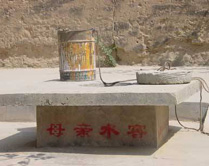 Chinese geologists have been discovering more reserves of underground water in the country's vast dry western regions, giving hope to millions of local residents that they can continue to live in their ancestral hometowns.
Chinese geologists have been discovering more reserves of underground water in the country's vast dry western regions, giving hope to millions of local residents that they can continue to live in their ancestral hometowns.
The China Geological Survey announced last month that it drilled 352 wells and found more than 50 water sources in the western regions to the secure provision of around 1 billion cubic meters of fresh water every year.
That is the equivalent of 10 large reservoirs, said Li Xiaowei, a publicity officer with the survey organization.
China's dry western regions make up over one-third of the country's land area, stretching from the Loess Plateau to the Taklimakan Desert, and from the Ordos Basin to the Hexi Corridor. Of the 90 million people living there, 12.26 million suffer from water shortages.
Since the foundation of the People's Republic of China in 1949, the central government has sought to find sufficient fresh water supplies for the area. Efforts were stepped up a few years ago due to the country's ambitious western-development campaign.
The years 2001 and 2002 alone saw a financial injection of 40 million yuan (US$4.8 million), according to survey statistics.
"Luckily, all the money and effort have achieved something," said Li.
One breakthrough after another has been reported in regions that used to be regarded as having no potential for underground water reserves, such as the Ordos Basin, which is covered with thick loess.
After careful investigations, the survey predicted that as much as 25 billion cubic meters of fresh water can be extracted from underneath the basin. This is roughly equivalent to six times the Miyun Reservoir in Beijing.
Fifty-five wells have already been successfully drilled in the area, meeting the daily demand of 232,000 people.
Yin Yuzhen, who is well-known for her large-scale tree planting in the deserts of Ordos, said these wells greatly help local people in their everyday life and work, allowing many of them to bathe as often as they like, instead of once a year as was the case with most of them.
Similar benefits are being enjoyed by people in some eastern areas of Southwest China's Sichuan Province and Chongqing Municipality, areas that are rich in purple-colored soil but poor in surface water.
After several years of effort, survey engineers helped local people develop low-cost wells to take advantage of the area's scattered shallow underground water. They also helped build a rooftop pipe network to collect and store rainfall for future use.
Leading survey official Qiu Xinfei said: "A whole set of such equipment, costing 4,000 yuan (US$480) at most, will enable a family of three to live much more comfortably than they used to.
"At least they need no longer travel miles to get a day's drinking water, can bathe more than once a week and have water to irrigate their crops."
However, the inspiring discoveries do not indicate any significant improvement in the overall water-supply situation in western China, said Jiang Jianjun, director of the Geological Environment Department of the Ministry of Land and Resources.
Instead, he warned of possible new waste in that regard.
"The ministry will push for the establishment of a new rule forbidding the development of industries that are heavy consumers of water resources in the newly found water-source areas. The hard-discovered fresh water should be limited mainly to the daily use of local people because the newfound underground water is, in most senses, the last hope for the area," said Jiang.
The ministry wrapped up its second national survey on underground water earlier this month. Jiang said it expects to publish the results by mid-April after getting ministerial approval. The first national survey was conducted in 1984.
In an exclusive interview with China Daily, Jiang said the overall quality of the country's underground water is deteriorating due to heavy engineering work and to excessive extraction in coastal cities, which has resulted in the invasion of seawater.
"We cannot let the same thing happen to the newfound water in the western regions," said Jiang.
(China Daily March 24, 2003)
|

